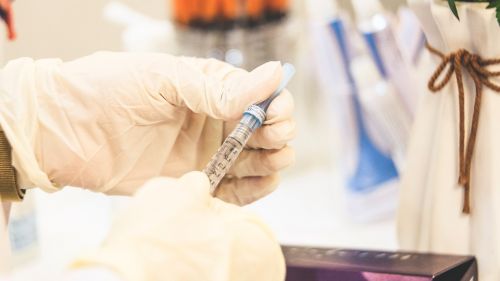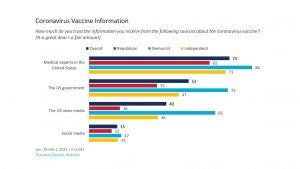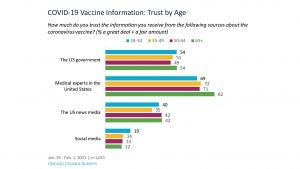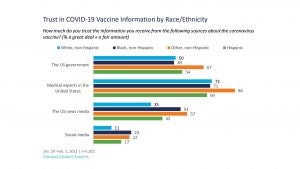Partisanship Divides Americans on COVID-19 Vaccine Information

Most Americans trust the information they receive from medical experts, distrust what they see on social media, and there is a partisan divide on trusting information from the US government and media.
Providing Americans with accurate information about the COVID-19 vaccine from trusted sources will be a key challenge for health policymakers in 2021. Results from a new Chicago Council survey, conducted January 29 – February 1 among a national sample of 1,021 adults, finds both good and bad news for the coming vaccination effort and the accompanying messaging campaign.
First, the good news. Our data show that most Americans (73%) have a great deal or a fair amount of trust in the information they receive from medical experts in the United States about the coronavirus vaccine. And while many health experts and policy analysts are concerned about social media as a vector for disinformation, few Americans trust vaccine information they receive by social media (15%).
The bad news: trust in vaccine information from the US government and news media is starkly polarized along partisan lines. While seven in ten Democrats (72%) trust information from the government, only a third of Republicans (35%) and half of Independents (47%) say the same. Trust in the media is even lower: two-thirds of Democrats (65%), but only a third of Independents and sixteen percent of Republicans trust vaccine information they get from the media. This partisan divide will complicate efforts to vaccinate the American population quickly and with sufficient coverage to reach the needed level of herd immunity to resume normal daily life.

Older Americans More Trusting of Key Vaccine Information Sources
Age is also a key factor to the vaccination campaign. Compared to younger Americans, older Americans are far more likely to be hospitalized or die as a result of COVID-19 infections. As such, they’ve been priority targets for vaccines, though different states have different rules about the precise age cut-off for being considered a priority. Fortunately for vaccination efforts, older Americans are more likely to trust information coming from US medical experts.

As polling from the Kaiser Family Foundation and Axios/Ipsos have both shown, the share of Americans who want a COVID-19 vaccine as soon as possible has increased as the vaccine rollout has begun in the United States. However, the same divides on sources of vaccine information also appear in divisions over vaccine enthusiasm and hesitancy.
As KFF polling from January demonstrates, Americans over 65 (66%) and Democrats (64%) are the most likely groups to report wanting to get the vaccine as soon as possible (or have already been vaccinated). By contrast, younger Americans are more likely to say they plan to wait and see how the vaccine works for other Americans. And Republicans are the most reluctant vaccination group, with a third (33%) saying they would either not get it (25%) or would only get it if required to (9%).
The Impact of Race
Race has also been a significant factor in the pandemic, with COVID-19 having disparate impacts on different racial groups of Americans. And while Black and Hispanic Americans are more likely to say they plan to wait and see how the COVID-19 vaccines work for others, that may not be due to trusted sources of information. Indeed, Black and Hispanic Americans are more likely than white Americans to trust the news media for vaccination information and are as likely as whites to trust the US government and US medical experts. However, they are also more likely to say they trust social media for vaccination information, which KFF polling points out is correlated with vaccine hesitancy and a greater likelihood to believe vaccine misinformation.

For more on views of the COVID-19 pandemic, see the latest Chicago Council update on global public opinion and the coronavirus, and sign up for email updates on our latest data and analysis.

